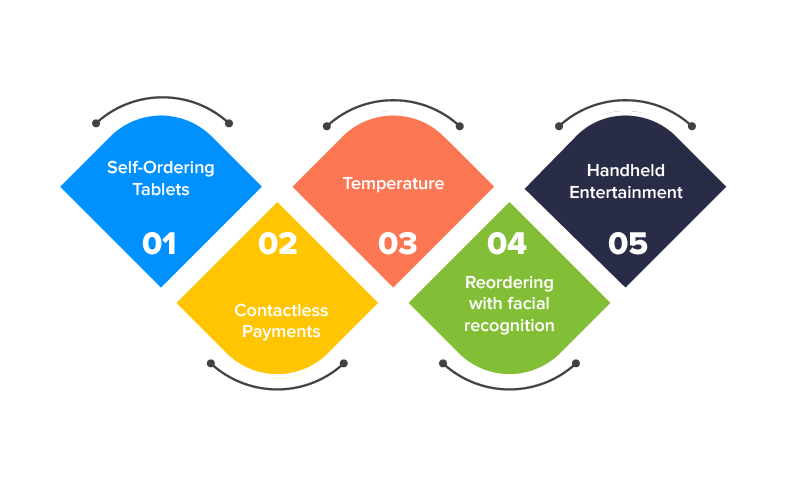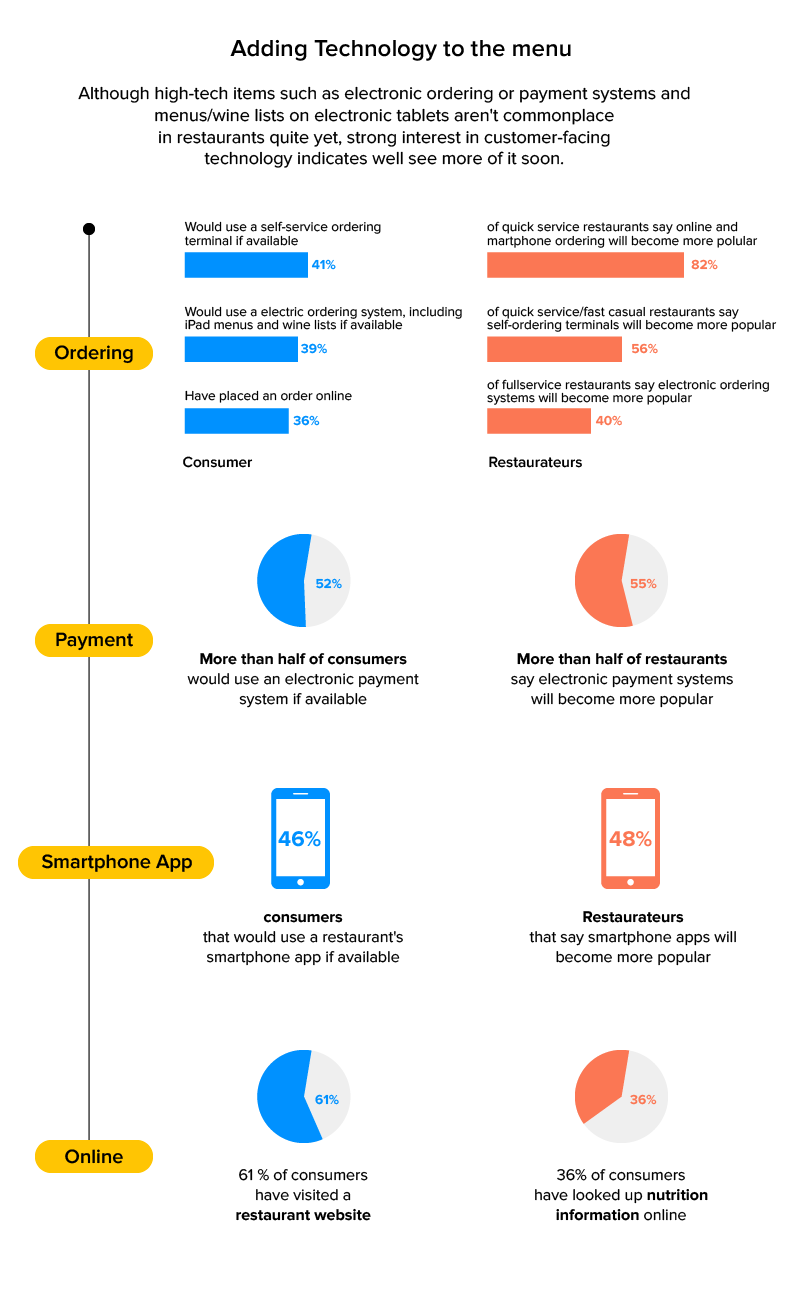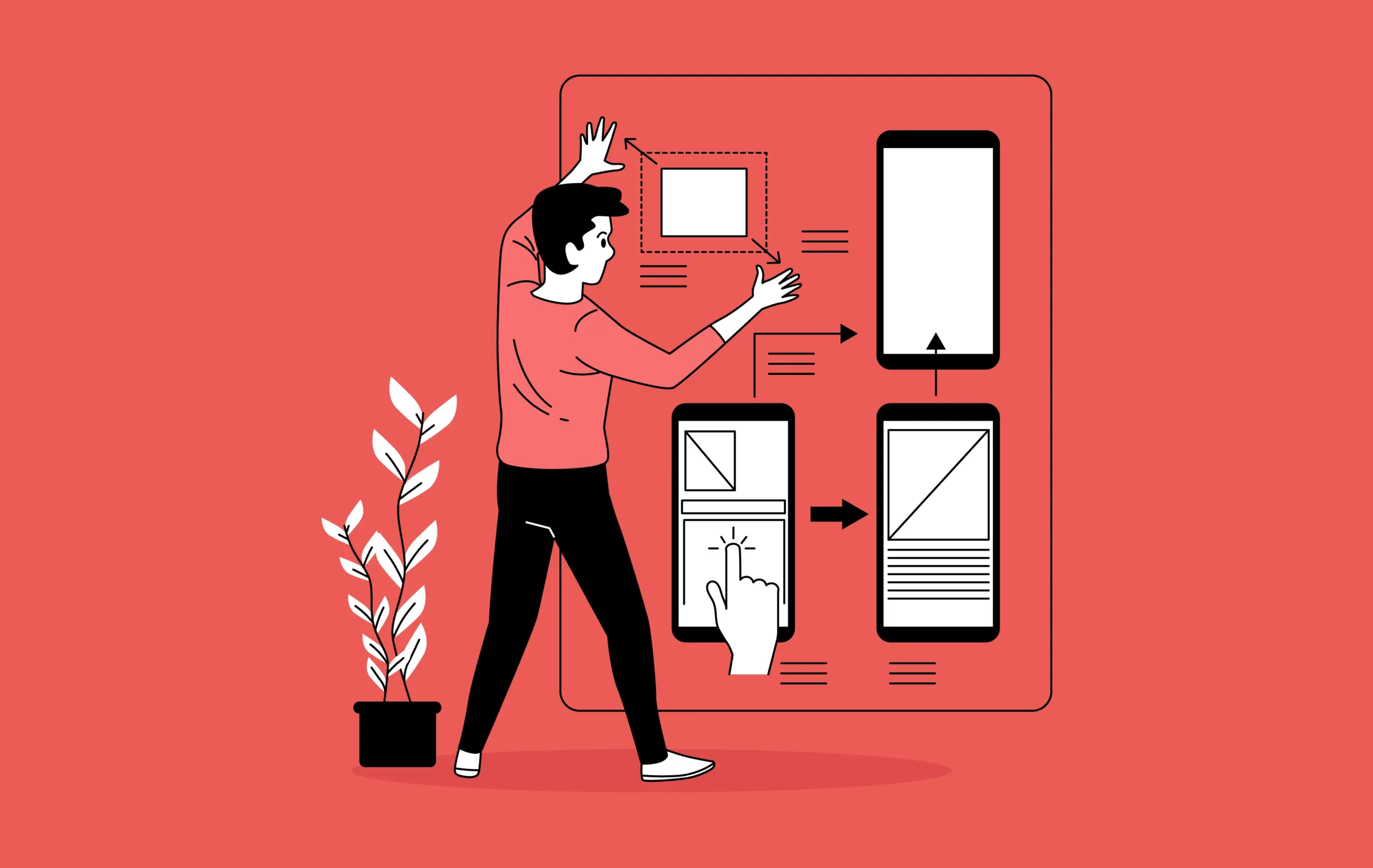- What Is Restaurant Technology?
- 5 Revolutionary Technologies Bringing a Change in the Restaurant Industry
- 1. Self-Ordering Tablets
- 2. Contactless Payments
- 3. Bluetooth Temperature Sensors
- 4. Reordering With Facial Recognition
- 5. Handheld Entertainment
- Ways Restaurant Technology is Transforming the Industry
- 1. Supplier and Employee Onboarding
- 2. Material Handling
- 3. Reservation Management
- 4. Food and Beverages
- 5. Quality Control
- Innovation in Food Industry
From paper calendars and notebooks to custom-code digital processes and software platforms, the food industry has witnessed numerous technological transformations. The way restaurant businesses operate and run, has become drastically streamlined and automated.
If you’re a restaurant manager or owner not being able to focus on important aspects of your business, signs are that you’ve not been exposed to innovative restaurant technology that allows you to achieve operational efficiency.
However, don’t confuse this revolutionary progress with updated ovens and economical dishwashers (not even a coffee machine!). The latest use of technology in restaurant industry makes the food business omnichannel and more digital.
Restaurant technology is more than just a trend. You can sit, relax in any corner of the globe and know what’s happening in your restaurant – be it dining, service management, or even stocks!
As a general rule of thumb, thinking of a restaurant as just a business about eating is straight out dumb. Here’s a quick list of stats that indicate the importance of technology in restaurants or the food industry:
- 63% of consumers believe that online ordering is more convenient in comparison to dining out with their family.
- More than 80% of restaurants are adopting technology in their operations – like reservations, online ordering, and restaurant analytics.
- 68% of consumers admitted that the use of server tablets in restaurants improved their dining experience gradually.
The stats are not about a brand-new refrigerator or dishwasher. Apart from the clean plates and tidiness, the customer barely notices any changes in a restaurant (at least on a conscious level). Before you learn how emerging restaurant technology is shaping the industry, you need to know what it is in general
What Is Restaurant Technology?
If we talk about Restaurant Technology in a layman’s words, then it can be portrayed as a dedicated tech that helps commercial kitchens become more sustainable while saving time, labor and money.
In the past, the process of managing a restaurant involved using notebooks and a calendar with each data written by hands. This means you needed to provide human efforts to capture order data, sort transactions, and report about performance. The present day structure however belongs to cloud computation and automation.
The culture of cloud computing and automation has been receiving constant attention for a while. Across a variety of industries, the adoption of automation and cloud-based software has been increased dramatically, and the restaurant business is no exception. Cloud-based restaurant POS systems have become increasingly popular as they are easy to install, remotely workable and one time investment for long.
Restaurant technology relies on a network of computers or remote servers that are hosted on the world wide web to manage, store, and process data. It’s not only convenient but secure and tamper-proof too.
5 Revolutionary Technologies Bringing a Change in the Restaurant Industry

The world is changing every second and businesses need to adapt to a new era of customers – the ones who find something good and the next second, they own it. From the smart refrigerator in the kitchen to the invoice machine at the dashboard, restaurants are also greatly impacted by technological changes. Here’s a list of five technologies that are changing the restaurant industry completely:
1. Self-Ordering Tablets
After such long anticipation, the truly server-less restaurant experience is finally here. The self-ordering tablets have proved that there’s no place for human servers in a technologically-modern restaurant. Brands like McDonalds and Panera Bread have integrated self-ordering kiosks in many of their well-known locations.
This AI-based restaurant focused technology allows consumers to browse the food menu and choose their favorite dish without involving any employee.
2. Contactless Payments
As the pandemic invaded the world, the availability of contactless payment became an indispensable part of the dining experience. According to a survey, 34% of guests believe that mobile payment options are a crucial part of their dining experience.
With this technology, you can help your guests remain secure and safe by paying through the dip, tap, or swipe. This entirely eliminates the need for physical contact between staff and guests, especially at these unprecedented times.
3. Bluetooth Temperature Sensors
If you’re a restaurant owner, you already know that following food safety guidelines by HACCP is a task in itself. To make sure they abide by all rules, a lot of restaurants are using Bluetooth temperature sensing to preserve a par level quality of their equipment and food. Restaurants have the ability to measure the temperature of their important assets, either manually or automatically, with the help of fixed probes and sensors.
4. Reordering With Facial Recognition
There are a few restaurants that are conducting facial recognition trial experiments that’ll allow consumers to reorder previous meals at self-service kiosks with the help of facial recognition. The trial was specifically conducted on restaurants that offer a menu with numerous optional customization layers. With such a great variety of choices, the simple way to reorder encourages the customer to think about coming back.
This technology can also be integrated with facial recognition to help establish loyalty and make business-customer relationships lasting by providing customers a way to reorder their favorite meals quickly.
5. Handheld Entertainment
The tablets in restaurants are more than just a way to make quick orders and pay. There are numerous companies like Buzz Time that provide tablets with entertaining trivia and games to restaurants. It also allows consumers to join nationally conducted competitions 15 hours a day and seven days a week.
These tablets can also be used to organize a live poker or trivia tournament in the restaurant. With this technology, restaurants can attract a plethora of customers at their place.
Like every other industry, the impact of technology on the restaurant industry is more than a tool for restaurants. Using technology in restaurants or the way you harness this tool will determine whether it works for your benefit or loss. As of now, everything seems to be on the positive side of the track.
Ways Restaurant Technology is Transforming the Industry

1. Supplier and Employee Onboarding
With the constant progress in virtual reality, AI, and augmented reality, the HR leaders in restaurants have gained a lot of benefits through technology. It allows new joiners, suppliers, and trainers to take a tour of the facility virtually with the help of software and headset without any additional costs.
This also allows trainees to complete their training without visiting the restaurant physically. They can even visit the employees in real-time and keep their learning going without even smelling or touching the food.
With such great progress in employee and supplier onboarding, your restaurant business can enjoy the freedom out of monotonous tasks. This also allows you to focus on numerous other important aspects of your business such as customer engagement and employee productivity.
2. Material Handling
If your business deals with a wide range of fresh and raw products, you might be aware of the significance of maintaining their freshness without incurring any losses in revenue. Several tech interventions offer material handling in the restaurant business.
These technologies use a variety of digital tools to reduce and prevent food wastage in restaurants by more than half. They’re also very helpful in connecting commercial kitchens with the cloud-kitchens and analyze the volume of food being wasted every day.
Moreover, with detailed real-time data, chefs can tweak their production process and make required improvements for reduced food wastage and make their kitchen even more profitable. They can also be integrated into POS to keep a regular track of the inventory.
3. Reservation Management
When it comes to the most long-lasting category of restaurant technology trends, nothing can beat the competency of reservation management tools. Several restaurant app development services allow people to book a reservation for dining on vacation and special occasions through your restaurant.
With the help of the solution you’ll find it easier to fill the empty seats of your restaurant at any point in time. Talking about efficiency, the technology in food service industry is lightyears ahead of the traditional practice of waiting for the reserved seats to fill without a proper plan for it.
4. Food and Beverages
To make sure your restaurant maintains a healthy bottom line, you need to keep a keen eye on the volume of your food and beverages. There is a large variety of food management systems that make the complete process easier by providing automated inventory counts and invoices.
They can also connect with your POS system and suppliers to view sales data and track orders. This allows you to prevent your food inventory from getting empty and keep your operations running around the clock.
5. Quality Control
After the outbreak of coronavirus, the quality of food has become a serious concern for restaurant businesses. It’s not only about maintaining the proper safety of your food supply chain but also about the assurance of quality that goes along with the transparency throughout the premises.
A survey revealed that 94% of restaurant food consumers are likely to be more loyal to businesses that provide complete transparency with their processes. Even though it’s pretty easy to say, implementation takes years.
Digital transformation in restaurant industry and technological interventions such as IoT sensors are a great way to detect and solve issues in food warehouses before they become a significant concern. They’re also necessary to monitor the temperature fluctuations in the warehouse.
Innovation in Food Industry
It turns out that the technology trends in restaurant industry was silent progress that came into existence after consumers changed their behavior because of economic and social factors. Now, it’s more of an experience-based model than a hospitality business. Future of restaurant technology trends can be seen in the restaurant industry that is using robots in their setup to take orders from customers and serve them. People are making use of restaurant mobile app development services to build apps that provide innovation strategies in restaurant business.


Excellence Together

Unveiling the Taste of Success in Food Delivery App Development – 3 Business Case Studies
In a world of evolving lifestyles and constant motion, how we dine is changing dramatically. We crave something quick and convenient to satisfy our culinary desires. And as our culinary cravings meet the digital age, food delivery applications emerge as a revolutionary solution, redefining how we enjoy the delights of gastronomy. In today's fast-paced and…

How Much Does It Cost to Develop an App Like KFC?
The restaurant industry is evolving by leaps and bounds, catering to the diverse needs of its customers. As per a report, the fast food market is growing—it jumped from $610.66 billion in 2022 to $652.73 billion in 2023 and is expected to reach $772.17 billion by 2027. A robust app can be a key part…









